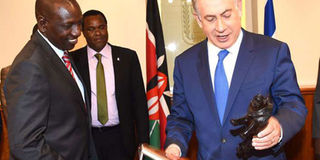All this noise coming out of ‘prayer’ rallies will not influence ICC case

Kenya Deputy President William Ruto (left) looks on as Israel's Prime Minister Benjamin Netanyahu admires a sculpture in his office in Jerusalem, Israel. If Mr Ruto is confident of his innocence, he should have no reason to fear because no court in the world would convict on such a flimsy case. PHOTO | REBECCA NDUKU | DPPS
What you need to know:
- But the accusations and counter-accusations are bringing about infantile political exchanges that obscure the real issue.
- The ultimate decision will be made on the evidence presented by the prosecution and the robustness of the defence’s case.
- If Mr Ruto is confident of his innocence, he should have no reason to fear because no court in the world would convict on such a flimsy case.
Our morally and mentally bankrupt politicians can shout themselves hoarse from all the rooftops they can find.
The Jubilee hordes can breathe fire and brimstone from the political prayer crusades against Deputy President William Ruto’s trial at the International Criminal Court.
They can burp with self-delusion that they have finally made the case that the Deputy President was “fixed” and, therefore, has no case to answer.
From the other side of the political divide, the equally feckless types from the Cord coalition can purr with satisfaction that the “confessions” of Gatundu South MP Moses Kuria about his role in buying witnesses against Mr Ruto are backfiring.
Instead of pinning the blame on opposition chief Raila Odinga, they are raising new questions about the role that President Kenyatta played in suborning witnesses to nail his deputy.
INFANTILE EXCHANGES
This “fixing” issue is opening cracks in the Jubilee coalition that Cord is only too happy to exploit, but the accusations and counter-accusations are bringing about infantile political exchanges that obscure the real issue.
One is that the question of whether Mr Ruto was sent to trial on false evidence will not be determined at noisy political rallies.
All those politicians out to catch the Deputy President’s eye with the loudest histrionics against the ICC or Mr Odinga would be best advised to shut up and take their testimony to The Hague.
Mr Ruto’s case will be determined, not on the decibels coming out of those rallies, but by the defence his competent team of lawyers put up in court.
However, rival offers by characters as diverse as Mr Odinga and Mr Kuria to travel to The Hague and testify in Mr Ruto’s defence amount to no more than cheap political theatrics that will never be fulfilled.
The noise coming out of political attack dogs and all manner of manoeuvres in Parliament, the African Union, the United Nations, and elsewhere amount to nothing and will not affect the outcome of the trial facing Mr Ruto and his co-accused, radio presenter Joshua Sang.
Neither the Jubilee-Cord rivalry nor ethnic fissures within the governing Kenyatta-Ruto coalition matter a bit in the courtroom.
THE IMPORTANT VERDICT
Even that diversionary scheme where Parliament will purport to interrogate and revise the findings of the Commission of Inquiry in Post-Election Violence, the Justice Waki Report, will amount to nothing more than self-flagellation.
The ultimate decision will be made on the evidence presented by the prosecution and the robustness of the defence’s case.
What puzzles me right now is that after exuding so much confidence earlier on, Mr Ruto’s hired guns seem to be in panic mode.
I have always maintained that the prosecution case against Mr Ruto was built on quicksand and was bound to collapse, just as the cases against Mr Kenyatta, Mr Francis Muthaura, Major General Hussein Ali, and Mr Henry Kosgey did.
Nothing has happened to change my mind, not even the controversial decision to admit recanted prosecution testimony.
It is also apparent that from the way the Kenya cases were handled, ICC itself is on trial and must be subjected to serious scrutiny in the way its conducts it affairs and the competence, or lack thereof, of its investigators, prosecutors, and judges.
That does not, however, justify the application of extra-judicial political pressure from outside the courtroom.
THE WORST SORT OF IMPUNITY
When Mr Ruto willingly and enthusiastically volunteered to be tried by the ICC rather than face a local tribunal or truth and reconciliation mechanism, he left himself to the mercy of the court and cannot wiggle out now.
If Mr Ruto is confident of his innocence, he should have no reason to fear because no court in the world would convict on such a flimsy case.
That his supporters seem mortally afraid of the case proceeding to its logical conclusion might, therefore, be quite telling.
The worst thing now is the peddling of the narrative that the conviction of Mr Ruto would undo all the peace and reconciliation efforts in the Rift Valley and lead to recurrence of the ethnic-political clashes that habitually rock the region with every electoral cycle.
That is a crass piece of blackmail that cannot be allowed to stand.
A court being forced to make a decision on the threat that violence could be unleashed is the worst sort of impunity.





